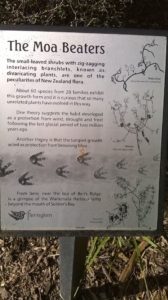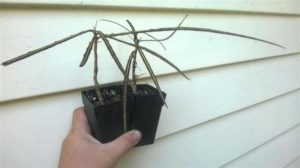1425: Moa and Lancewood
February 20, 2019
By AHNZ
 The little tree with PTSD about being eaten by a moa. Well, it does!
The little tree with PTSD about being eaten by a moa. Well, it does!
Lancewood, the Pseudopanax crassifolius. It takes 15-20 years to grow above the height of a moa at which point it morphs into proper tree form.
Moa are, of course, extinct, so when this tree calms down about having outlived its natural predator perhaps it can spend less time in this spindly form we sell it in. I’d be fascinated to discover that that 15-20 year period was dropping but the observational time-scale will, alas, be more years than my human lifespan.
Question: Isn’t this more natural history? How to you jam this information into an anarchist narrative, Rick?
Answer: It’s an ecological metaphor for market forces, deferred development, and offsetting behaviour. Duh.
Divaricating Shrubs: The Moa Beaters
 About 60 species from 20 families of native plants exhibit the quality of being ‘divaricating’, a particular peculiarity of New Zealland flora.
About 60 species from 20 families of native plants exhibit the quality of being ‘divaricating’, a particular peculiarity of New Zealland flora.
One theory for this is that the tangled up interlacing branchlets acted as protection from the moa. Or maybe New Zealand plants are psychic and anticipated the coming of deer and possums? If so, perhaps they don’t need The State to rain 1080 pellets down on our native forests after all.
Once again, despite the moa being gone, the plants have PTSD. Still ready to be attacked by an enemy long gone.
—
note: c.1425 the last moa became extinct so far as we yet can prove
Update 2020: Added in the bit about divaricating shrubs
Image ref. Information display from Fern Glen, Auckland
 Like Comment Share
Like Comment Share






